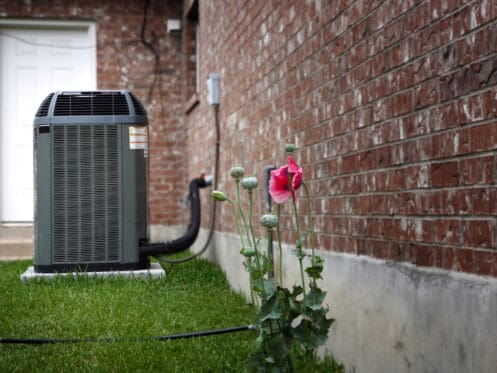We often take our indoor comfort for granted. While the elements rage outside, New Jersey residents remain comfortable inside their homes. Yet, extreme weather events in our area keep increasing due to climate change. You may not realize it, but extreme weather can stress your heating and cooling system, resulting in higher energy use and potentially premature failure.
What Is Extreme Weather?
Temperatures in New Jersey can range from below zero in the winter to sweltering heat, reaching triple digits in the summer. Extreme temperature swings represent just one way that weather can impact your HVAC system. Extreme weather encompasses much more and refers to severe and unpredictable conditions deviating significantly from average climate patterns.
Scientists believe climate change is responsible for most extreme weather events, including heat waves, stronger and more frequent hurricanes, floods, and intense storms. Many of these situations lead to longer operating times as homeowners rely heavily on their HVAC systems for indoor comfort. Components like compressors, condensers, and fans can become vulnerable to damage during these episodes, requiring earlier repair or replacement.
How Does Weather Affect Your HVAC System?
Although some people realize that extreme hot and cold temperatures make your HVAC work harder, so do events producing extreme precipitation. Humidity increases when rain or snow occurs, also making your system work harder. However, precipitation can also cause damage to your unit if water gets into it. Internal components can corrode and shorten the HVAC lifespan. Wind can also have a negative impact. When it’s windy, your HVAC has to work harder to push air through the ducts, representing another instance of increased energy use and higher utility bills. Getting the most out of your HVAC system requires homeowners to adjust thermostat settings during extreme weather and take precautions against precipitation, temperature, and wind.
What Your Air Conditioner Does in Extreme Heat
The additional stress that extreme heat puts on the air conditioning side of your system can result in poor cooling performance, increased noise, along with a notable rise in energy usage during scorching weather. Excessive heat can lower refrigerant levels, potentially harming the compressor.
What Happens to Your Heating System in Extreme Cold
The effect is similar to what happens when extreme heat affects your central system but with some decided differences. Insufficient insulation and sealing can make it more difficult for your HVAC system to maintain warmth. Poor ventilation can also affect how well your system works. Airflow issues can result in a cracked heat changer or an overheated furnace.
If you have an older heating system, it may not have the ability to function properly in extreme cold. Natural gas and propane units often struggle to maintain warmth, but electric systems can shut down completely. Your system becomes stressed when the outside temperature drops below 20 degrees Fahrenheit. You may feel that turning the system off at night, letting the interior temperature drop and then turning the thermostat up in the morning may be the best solution. However, if you have an older unit, it will struggle to reach and maintain an ideal temperature. If you set the thermostat too high during frigid weather, the furnace or heat pump will run constantly, endangering specific components. Try to maintain thermostat settings within several degrees of your ideal interior temperature, even during extreme cold, to minimize the chances of future failure.
Protecting Your HVAC System From Harsh Weather
Although you can’t prevent severe weather, you can take numerous simple steps to minimize stress on your HVAC system when an event occurs. Regularly do the following:
Changing or cleaning your air filters
Clearing vents of blockages
Properly insulating the outdoor unit during cold weather
Ensuring the indoor unit has proper sealing
Inspect Your System After an Extreme Event
Following an extreme weather event, inspect your HVAC system for damage. Examine the exterior first for missing or damaged panels, bent or missing denser fins, and other abnormalities. Inspect the interior for standing water or ice and clear it if you find any. Check coils for dirt and damage. If the coils are dirty, listen for unusual sounds. Examine the electrical connection for signs of corrosion. If you find any of these problems, you should contact First Choice Plumbing, Heating & Air Conditioning for maintenance, as attempting to perform this maintenance yourself can lead to damage. Calling for services as soon as possible will also minimize any imminent problems.
Remain aware of the warning signs of a failing HVAC system. These include poor performance, increased noise, excessive energy costs, bad smells, and more.
Schedule Regular Inspections and Maintenance
As a New Jersey homeowner, you can only do so much to protect your HVAC system. Experienced HVAC technicians must do most of the work. That’s why we recommend annual inspections for both the heating and cooling sides. You can avoid many of the problems arising from extreme weather through routine maintenance. Schedule tune-ups where a qualified technician will perform coil cleaning, check refrigerant levels, and more in your central air conditioner.
On the heating side, preventive maintenance will help prevent cracked heat exchangers, loose flue connections, and other dangerous situations that can result in high carbon monoxide levels in your home. With the increasing incidence of extreme weather events, ensuring your HVAC receives proper maintenance is more critical now than ever.
Consider Sealing and Insulation
If your home has inadequate insulation and sealing, extreme temperatures will have a more significant impact. Cool air will escape easily during the summer, while the opposite will happen in the winter.
Effective insulation and sealing can help lower energy costs, make your home cozier, and shield it from the effects of severe weather. Your HVAC system will have a decreased workload throughout the year, as insulation and sealing will keep temperatures under control. This will help extend the life of your central HVAC unit.
Do You Need HVAC Replacement?
If your heating or cooling system is more than 15 years old, you may notice it is struggling to keep up with your comfort demands during extreme weather because of aging parts. Contemporary systems have significantly higher efficiency than those manufactured even 10 years ago. Retrofitting your home with a properly sized new unit will reduce energy costs and decrease system workload during extreme weather. Consider creative solutions such as heat pumps or installing ductless mini-split systems in areas of your home that have decreased comfort.
Maintain Your New Jersey Home’s Comfort With First Choice Plumbing, Heating & Air Conditioning
Residents seeking a complete range of mechanical system services will find them at First Choice Plumbing, Heating & Air Conditioning. We provide residential and commercial HVAC repair, maintenance and installation, including convenient annual maintenance plans to keep your systems in top shape. Our company also has experienced plumbers who can handle an extensive list of water issues. These include plumbing leaks and repairs, installation and maintenance of water heaters, water treatment systems, and toilet and water fixture services.
Call our office today to schedule an appointment or consultation. You may also use our convenient online form for inquiries.




